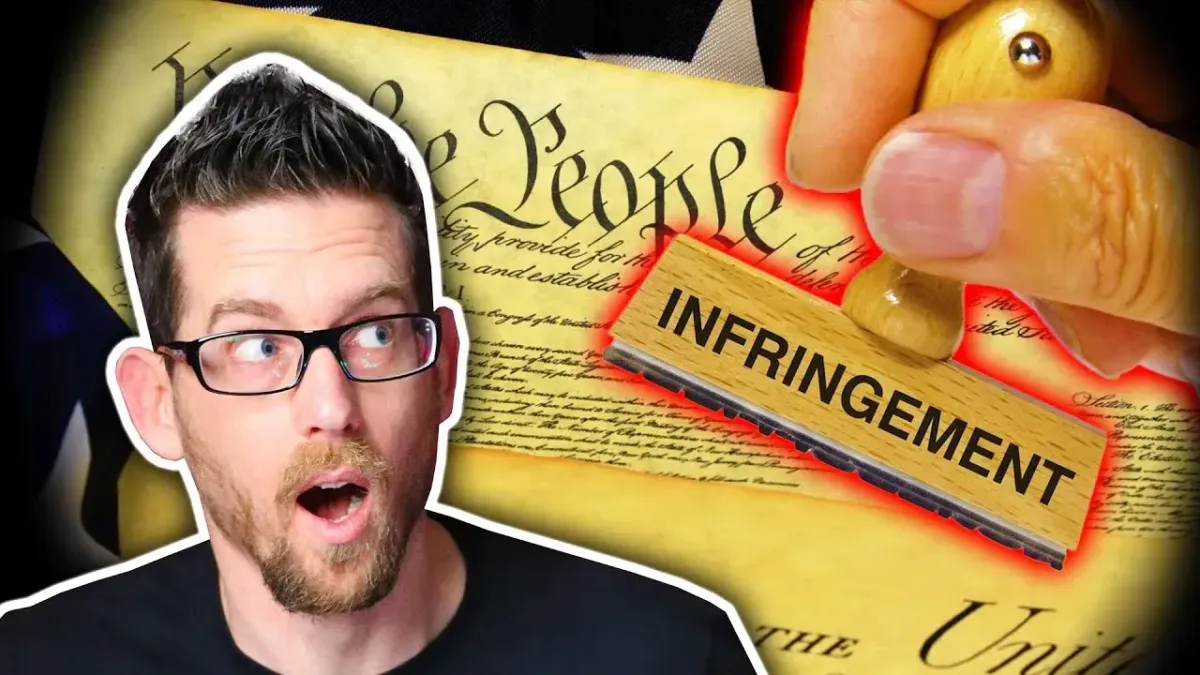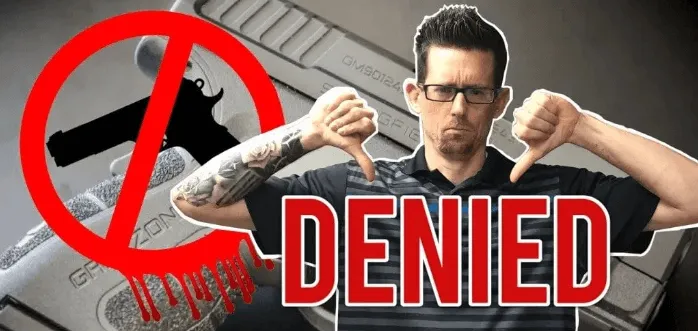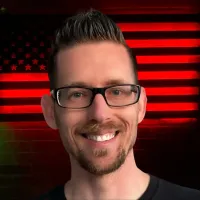Florida Concealed Carry Law Blog
Follow Us for News, Tips , Tricks, Guns Gear and Real Life Stories

The TRUTH About The Second Amendment
What's Up Sheepdogs? Ryan here with Tampa Carry.
Over the years, I have heard dozens of different interpretations of the Second Amendment. For such a short sentence, the meaning is heavily debated among gun owners and gun grabbers. The gun grabbers argue that owning a firearm must be connected to service in the Militia, which they claim is the National Guard. Many people also think that the Founders were only talking about muskets, and not AR-15's. For many years I didn't know how to answer these questions, until I read the U.S. Supreme Court case District of Columbia v. Heller.
Heller was a D.C. special policeman who wanted to keep a handgun at his home. The problem is, D.C. effectively banned handgun possession by making it a crime to carry an unregistered firearm and prohibiting the registration of handguns. Typical government bureaucracy. The police chief could issue a one-year license, which required Heller to keep his firearms unloaded and disassembled. What's the point of having a gun at home if the gun is disassembled? Heller filed suit, and in June of 2008, the Second Amendment and law-abiding gun owners received a massive victory.
I am going to take some time to review how the United States Supreme Court (USSC) interpreted the Second Amendment, why the Founding Fathers feared a tyrannical government, what firearms the Founders were referring to, and finally, the purpose of the Second Amendment. I am going to do this because it is so important for gun owners to understand our rights and what the Second Amendment really is.
I'll be including excerpts from the USSC opinion with page references, and I highly suggest that you take some time to read the entire D.C. v. Heller decision.
Does the Second Amendment Guarantee an Individual Right or a Right Connected to Service in the Militia?
One of the most common objections to the second Amendment is that the right to possess firearms is only protected for people serving in the Militia, which the gun grabbers say refers to the National Guard. According to the USSC, this is not accurate.
a. "Right of the People." The first salient feature of the operative clause is that it codifies a "right of the people." The unamended Constitution and the Bill of Rights use the phrase "right of the people" two other times, in the First Amendment's Assembly-and-Petition Clause and in the Fourth Amendment's Search-and-Seizure Clause. The Ninth Amendment uses very similar terminology ("The enumeration in the Constitution, of certain rights, shall not be construed to deny or disparage others retained by the people"). All three of these instances unambiguously refer to individual rights, not "collective" rights, or rights that may be exercised only through participation in some corporate body.
"the people," the term unambiguously refers to all members of the political community, not an unspecified subset.
Supreme Court of the United States (District of Columbia v. Heller) Page 5This statement should show you that the founders viewed the right to possess firearms as an individual right. It is strengthened by four State Constitutions created before the U.S. Constitution was ratified.
Pennsylvania's Declaration of Rights of 1776 said: "That the people have a right to bear arms for the defence of themselves, and the state . . . ."
In 1777, Vermont adopted the identical provision, except for inconsequential differences in punctuation and capitalization.
North Carolina also codified a right to bear arms in 1776: "That the people have a right to bear arms, for the defense of the State . . . ."
The 1780 Massachusetts Constitution presented another variation on the theme: "The people have a right to keep and to bear arms for the common defence. . . ." Supreme Court of the United States (District of Columbia v. Heller) Page 28
If Owning Firearms Is an Individual Right, What Does "a Well Regulated Militia" Mean?
Think back to when the Founders were living. Britain was a powerful government oppressing the American colonists. The Founding Fathers didn't like the fact that the government was so powerful. Many were opposed to the idea of a standing army for fear that it would one day be turned against the people. Instead, the Founding Fathers believed that the people would be the first line of defense against insurrection or invasion.
In United States v. Miller, 307 U. S. 174, 179 (1939), we explained that "the Militia comprised all males physically capable of acting in concert for the common defense." Supreme Court of the United States (District of Columbia v. Heller) Page 22
The Founders believed that all men between the ages of 18 and 45 who were physically capable were members of the Militia. It was up to these men to be the first line of defense against any enemy attack.
Unlike armies and navies, which Congress is given the power to create ("to raise . . . Armies"; "to provide . . . a Navy," Art. I, §8, cls. 12–13), the Militia is assumed by Article I already to be in existence. Congress is given the power to "provide for calling forth the militia," §8, cl. 15; and the power not to create, but to "organiz[e]" it—and not to organize "a" militia, which is what one would expect if the Militia were to be a federal creation, but to organize "the" Militia, connoting a body already in existence, ibid., cl. 16. This is fully consistent with the ordinary definition of the Militia as all able-bodied men.Supreme Court of the United States (District of Columbia v. Heller) Page 23
Doesn't ‘Well Regulated’ Mean Highly Regulated or Restricted?
The gun grabbers love the term "well regulated" because they see it as permission to impose burdensome rules, restrictions, and laws on law-abiding gun owners. The U.S. Supreme Court has a different interpretation.
Finally, the adjective "well-regulated" implies nothing more than the imposition of proper discipline and training. Supreme Court of the United States (District of Columbia v. Heller) Page 23
Well, gun grabbers, your number one talking point just got demolished. In the famous words of comedian Dave Chappelle, "I guess you'll just have to shut the @*&% up."
If the Second Amendment Is about Individual Rights, Why Does It Say ‘Security of a Free State?’
Part of the argument the gun grabbers use is that the Second Amendment guarantees the right of the Militia, who, in their opinion, is the National Guard, to protect their state.
b. "Security of a Free State." The phrase "security of a free state" meant "security of a free polity," not security of each of the several States.
Joseph Story wrote in his treatise on the Constitution that "the word 'state' is used in various senses, [and in] its most enlarged sense, it means the people composing a particular nation or community.”
It is true that the term "State" elsewhere in the Constitution refers to individual States, but the phrase "security of a free state" and close variations seem to have been terms of art in 18th-century political discourse, meaning a "'free country'" or free polity.Supreme Court of the United States (District of Columbia v. Heller) Page 24
Vocabulary.com defines the term polity as "a political group of any size or shape. It can be a government, a state, a country, or even a social group." The two that make the most sense are "free country or free society." Again, this is just my opinion, but if true, the Second Amendment could more clearly read:
"A well-trained group of men, being necessary to the security of a free society, the right of the people to keep and bear firearms, shall not be infringed.”What Does It Mean to ‘Keep and Bear Arms?’
One of the most highly contested points of the Second Amendment is the type of firearms the Founders intended to protect. Some argue that only muskets are safeguarded, and not modern firearms like an AR-15 or AK-47. The Founders were not stupid. They knew technology would improve over time, and so would the types of arms Americans would own.
b. ...Before addressing the verbs "keep" and "bear," we interpret their object: "Arms." The 18th-century meaning is no different from the meaning today. The 1773 edition of Samuel Johnson's dictionary defined "arms" as "weapons of offence, or armour of defence.".... Timothy Cunningham's important 1771 legal dictionary defined "arms" as "anything that a man wears for his defence, or takes into his hands, or useth in wrath to cast at or strike another."
Supreme Court of the United States (District of Columbia v. Heller) Page 7
Some have made the argument, bordering on the frivolous, that only those arms in existence in the 18th century are protected by the Second Amendment. We do not interpret constitutional rights that way. Just as the First Amendment protects modern forms of communications, … and the Fourth Amendment applies to modern forms of search, …, the Second Amendment extends, prima facie, to all instruments that constitute bearable arms, even those that were not in existence at the time of the founding.
Supreme Court of the United States (District of Columbia v. Heller) Page 8Thankfully our constitutional rights are not limited to the technology available in the 18th century. If this were true, we would have a First Amendment right to freedom of speech, but only in face-to-face conversations or handwritten letters and not via text, social media, video, or even over the phone. So this means that the Second Amendment protects my AR-15, AK-47, and many other firearms in the same way as it does my muzzle-loading pistols.
‘Keep Arms’ and ‘Bear Arms’
We turn to the phrases "keep arms" and "bear arms." Johnson defined "keep" as, most relevantly, "[t]o retain; not to lose," and "[t]o have in custody." Johnson 1095. Webster defined it as "[t]o hold; to retain in one's power or possession." No party has apprised us of an idiomatic meaning of "keep Arms." Thus, the most natural reading of "keep Arms" in the Second Amendment is to "have weapons."
Supreme Court of the United States (District of Columbia v. Heller) Page 8‘Bear’
If you are a fan of Family Guy, you probably remember the scene where the Founding Fathers are discussing
how every American has the right to hang a pair of bear arms on their wall. It's pretty funny, but I don't think it's an accurate interpretation of what the Founding Fathers meant by "bear arms."
At the time of the founding, as now, to "bear" meant to "carry."
Supreme Court of the United States (District of Columbia v. Heller) Page 10From our review of founding-era sources, we conclude that this natural meaning was also the meaning that "bear arms" had in the 18th century. In numerous instances, "bear arms" was unambiguously used to refer to the carrying of weapons outside of an organized militia. The most prominent examples are those most relevant to the Second Amendment: Nine state constitutional provisions written in the 18th century or the first two decades of the 19th, which enshrined a right of citizens to "bear arms in defense of themselves and the state" or "bear arms in defense of himself and the state." It is clear from those formulations that "bear arms" did not refer only to carrying a weapon in an organized military unit.
Supreme Court of the United States (District of Columbia v. Heller) Page 11-12Once again, it appears that the term "bear arms" refers to an individual's right to possess and carry a weapon independent of the individual's service in the Militia.
‘Keep and Bear Arms’
Now that we've broken down each element into the original meaning, we’re going to see what the USSC has to say about the connected term "keep and bear arms."
c... Putting all of these textual elements together, we find that they guarantee the individual right to possess and carry weapons in case of confrontation. This meaning is strongly confirmed by the historical background of the Second Amendment. We look to this because it has always been widely understood that the Second Amendment, like the First and Fourth Amendments, codified a pre-existing right.
Supreme Court of the United States (District of Columbia v. Heller) Page 19
The Founding Fathers didn't believe the right to possess firearms was granted by the Bill of Rights, the Constitution, or the government. Instead, they thought that it was a pre-existing right given to all people by our Creator.
As we said in United States v. Cruikshank, …”[t]his is not a right granted by the Constitution. Neither is it in any manner dependent upon that instrument for its existence. The Second Amendment declares that it shall not be infringed. Supreme Court of the United States (District of Columbia v. Heller) Page 19
Does the Government Have a Right to Infringe Upon or Regulate the Second Amendment?
This topic is where some gun owners begin to disagree. Some claim that all firearm laws are illegal and in direct violation of the U.S. Constitution, while others believe that the Second Amendment, like all other amendments, is not unlimited.
Like most rights, the Second Amendment right is not unlimited. It is not a right to keep and carry any weapon whatsoever in any manner whatsoever and for whatever purpose: For example, concealed weapons prohibitions have been upheld under the Amendment or state analogs. The Court's opinion should not be taken to cast doubt on longstanding prohibitions on the possession of firearms by felons and the mentally ill, or laws forbidding the carrying of firearms in sensitive places such as schools and government buildings, or laws imposing conditions and qualifications on the commercial sale of arms. Miller's holding that the sorts of weapons protected are those "in common use at the time" finds support in the historical tradition of prohibiting the carrying of dangerous and unusual weapons. Supreme Court of the United States (District of Columbia v. Heller) Page 2
It's important to note the phrase "in common use at the time" because this is the legal basis for why the AR-15 is protected by the Second Amendment. This statement is also the reason why the National Firearms Act was passed in 1934 to restrict so-called dangerous and unusual weapons not in common use at the time, such as machine guns, short-barreled rifles, short-barreled shotguns, silencers, and destructive devices.
There seems to us no doubt, based on both text and history, that the Second Amendment conferred an individual right to keep and bear arms. Of course, the right was not unlimited, just as the First Amendment's right of free speech was not, … Thus, we do not read the Second Amendment to protect the right of citizens to carry arms for any sort of confrontation, just as we do not read the First Amendment to protect the right of citizens to speak for any purpose. Supreme Court of the United States (District of Columbia v. Heller) Page 22
Like most rights, the right secured by the Second Amendment is not unlimited. From Blackstone through the 19th-century cases, commentators and courts routinely explained that the right was not a right to keep and carry any weapon whatsoever in any manner whatsoever and for whatever purpose... For example, the majority of the 19th-century courts to consider the question held that prohibitions on carrying concealed weapons were lawful under the Second Amendment or state analogues... Although we do not undertake an exhaustive historical analysis today of the full scope of the Second Amendment, nothing in our opinion should be taken to cast doubt on longstanding prohibitions on the possession of firearms by felons and the mentally ill, or laws forbidding the carrying of firearms in sensitive places such as schools and government buildings, or laws imposing conditions and qualifications on the commercial sale of arms. We also recognize another important limitation on the right to keep and carry arms. Miller said, as we have explained, that the sorts of weapons protected were those "in common use at the time." We think that limitation is fairly supported by the historical tradition of prohibiting the carrying of "dangerous and unusual weapons." Supreme Court of the United States (District of Columbia v. Heller) Page 54-55
The problem that I have with all of this is the Second Amendment is the only amendment in the Bill of Rights that says "shall not be infringed." Here are a few definitions I found for "infringed."
USSC DC v. Heller page 40 - curtailed, or broken in upon, in the smallest degree;
Here is what dictionary.com says infringed means:
to commit a breach or infraction of; violate or transgress
to encroach or trespass
If the Founding Fathers truly believed that our right to own firearms should not be curtailed or restricted even to the smallest degree, why are states like New York, New Jersey, California, Massachusetts, Connecticut, and Maryland allowed to pass such strict firearms laws?
Why the Second Amendment Was Created
Recently, a student of mine asked me why I needed to own an AR-15. I responded by telling her that I don't need an AR-15; I need 12. She wasn't thrilled with my response. She went on to say that the Second Amendment was created for self-defense and hunting. "You don't need an AR-15 for self-defense or hunting," she stated boldly. First of all, the Second Amendment is not about hunting or even self-defense. The Founding Fathers had three reasons for an individual's right to own firearms.
First, of course, it is useful in repelling invasions and suppressing insurrections. Second, it renders large standing armies unnecessary. Third, when the able-bodied men of a nation are trained in arms and organized, they are better able to resist tyranny. Supreme Court of the United States (District of Columbia v. Heller) Page 24
During World War 2, a Japanese general was asked why they chose to not launch a ground attack on America.
"There would be a rifle behind every blade of grass," the general replied.
Unlike most countries in the world, you can't just invade America because you wouldn't only be fighting the U.S. military. You would have millions of veterans and sheepdogs just like me standing on the front lines defending our communities from attack.
The final reason for the Second Amendment is by far the most powerful, in my opinion.
"when the able-bodied men of a nation are trained in arms and organized; they are better able to resist tyranny."
Without firearms, we are slaves who must bow down to the wishes of an overreaching government.
That history showed the way tyrants had eliminated a militia consisting of all the able-bodied men was not by banning the Militia but only by taking away the people's arms, enabling a select militia or standing army to suppress political opponents. Supreme Court of the United States (District of Columbia v. Heller) Page 25
Why Did the Founding Fathers Fear a Tyrannical Government?
Did they somehow look into the future and see how world leaders would strip the right to bear arms from their citizens and commit genocide? Or was it because they knew that the best way to predict the future was to look at the past?
Between the Restoration and the Glorious Revolution, the Stuart Kings Charles II and James II succeeded in using select militias loyal to them to suppress political dissidents, in part by disarming their opponents. Under the auspices of the 1671 Game Act, for example, the Catholic James II had ordered general disarmaments of regions home to his Protestant enemies. These experiences caused Englishmen to be extremely wary of concentrated military forces run by the State and to be jealous of their arms. They accordingly obtained an assurance from William and Mary, in the Declaration of Right (which was codified as the English Bill of Rights), that Protestants would never be disarmed: "That the subjects which are Protestants may have arms for their defense suitable to their conditions and as allowed by law."... This right has long been understood to be the predecessor to our Second Amendment. Supreme Court of the United States (District of Columbia v. Heller) Pages 19-20
Thus, the right secured in 1689 as a result of the Stuarts' abuses was by the time of the founding understood to be an individual right protecting against both public and private violence.Supreme Court of the United States (District of Columbia v. Heller) Page 21
And, of course, what the Stuarts had tried to do to their political enemies, George III had tried to do to the colonists. In the tumultuous decades of the 1760's and 1770's, the Crown began to disarm the inhabitants of the most rebellious areas. That provoked polemical reactions by Americans invoking their rights as Englishmen to keep arms. A New York article of April 1769 said that "[i]t is a natural right which the people have reserved to themselves, confirmed by the Bill of Rights, to keep arms for their own defense."Supreme Court of the United States (District of Columbia v. Heller) Page 21
Throughout history, kings and governments have abused their power to kill and suppress their people. It happened before the creation of the Bill of Rights; it happened during the American Revolution, and it happened in the 1800s to freed black slaves so that they could be recaptured and enslaved. Gun control has been at the heart of every evil act committed in modern history.
In World War 2, Nazi-controlled Germany seized guns from the population, and shortly after that, the Holocaust began, leading to the deaths of over 6 million Jews. Hitler wasn't the only leader to use gun control to consolidate power and control his people. Mao Zedong, Joseph Stalin, Benito Mussolini, and Fidel Castro have all used gun control to strip their citizens of their God-given right to possess firearms.
As you know, these gun confiscations have led to the murder of close to 100 million people. The gun grabbers laugh at the claim that a tyrannical government might one day appear in America. Why is that so hard to imagine? History tends to repeat itself, so why would this be any different? Thank God the Founding Fathers had enough forethought to see that evil is real and some politicians are not working for the good of the people but their own gain. We must do everything we have to and protect the rights of the people from evil tyrants who seek to deny us our God-given rights.
That's all I have for today. So until next time keep training and stay safe...Talk to you soon,
Ryan G. Thomas
P.S. You’re one step away from getting your Florida concealed carry permit….FAST & EASY…
And for a limited time you can watch the concealed carry course online for free... Click here to get started...
Don't Miss a Thing!
Get Notified When We Post a New Article
Most Popular Concealed Carry Articles

Florida Private Gun Sales Rules

Am I Eligible For A Florida Concealed Carry Permit?
Get FREE Access To The Florida Concealed Carry Masterclass™
Join over 60,000 Floridians Who Chose Tampa Carry To Get Their Florida Concealed Carry Permit
All rights Reserved. Copyright 2026 Tampa Carry



